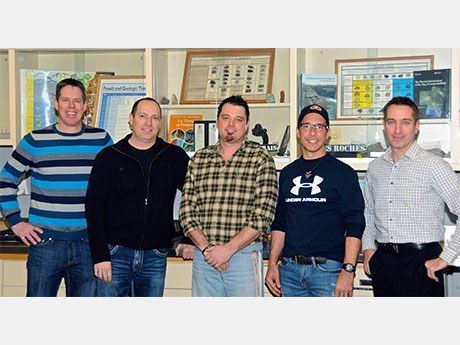Prospecting, mineral exploration program to accept students in September
Aspiring mineral hunters can hone their skills or glean new expertise this fall when Collège Boréal launches its new prospecting and mineral exploration program.
The two-year course will prepare students to work in the earliest stages of mineral search and discovery. They’ll learn about all aspects of mining in the field and underground, including exploration, development and operations.
As prospecting and exploration technicians, they will be trained to prepare exploration projects and geological surveys, and to supervise drilling. Working under the direction of geologists, engineers and site managers, graduates will collaborate on diamond drilling programs with mine operators and mine technical services.
“It’s an opportunity for somebody to be job ready,” said program co-ordinator and teacher Jeff Lafortune.
This new course of study was developed in response to junior mining companies and exploration firms surveyed by the college.
“A lot of them said we need those types of prospecting technicians for our companies,” said Brian Vaillancourt, Collège Boréal’s dean of the School of Trades and Applied Technology. “Basically, they’re looking for a competent workforce.”
Bilingual grads
Although the Haileybury School of Mines and Saskatchewan’s Northlands College have been training students in mineral prospecting and exploration for years, Collège Boréal’s diploma program is unique in that it will be taught in French.
“Students coming out of our program will be bilingual, so depending on where they’re going throughout the country it can be an advantage,” said Vaillancourt. “Our objective is to train a competent workforce, regardless of the language.”
Another distinctive aspect is the college’s location at the heart of the mineralrich Sudbury Basin. “That is our classroom,” said Lafortune.
The program will bring students who love exploring the outdoors into the classroom to provide them with the tools to explore for minerals and identify geological structures, he said. Graduates will be capable of a wide range of exploration activities, including claim staking, field mapping and drill core logging. The skill set is based on needs identified by the mining industry.
Companies will be able to employ graduates as job-ready technicians, as opposed to training personnel on the job, said Lafortune.
The curriculum is extensive. It covers geology, geometry, engineering drafting and includes fluid mechanics, communications technologies and computer science.
In addition to applied mathematics, physics and chemistry, students will study French and English communication. They’ll be introduced to natural resources cartography, prospecting, exploration, mine development, mine ventilation, mining methods and site rehabilitation.
Students will learn to interpret aerial photography. They’ll be introduced to geographical information systems and how they apply to natural resources.
They’ll also study forestry operations and how to assess various scenarios to minimize impact on forest ecosystems.
Surveys
Boréal’s exploration technicians will be taught to perform a basic geological survey in the field. “Students will be able to prepare material and equipment and carry out, on their own, a geographical survey of an underground and open-pit mine,” the course outline states. “They will be able to (set up) a camp following all the laws and regulations governing work undertaken in a forest, and produce a geological report according to the standards of the industry.”
Students will be taught about geophysical and geochemical surveys and exploration drill holes. “At the end of this course, students will be able to set up surveys in the field, oversee their unfolding and gather and analyze samples.”
Full-time teachers with a wealth of information about the industry, including some who have their own mining consulting companies, will train students. Part-time teachers from the industry will also instruct.
Although grassroots mineral exploration has dropped substantially in Ontario, college officials are optimistic about employment prospects for graduates.
“Students that come out with a great grade average, they’re going to get the jobs and there will be opportunities for others,” Lafortune said.
The current period of job scarcity in prospecting and exploration may be the ideal time for some people to stay in or go back to school to obtain more marketable skills.
It’s hard to predict program enrolment, especially during a downturn in the mining industry, said Vallaincourt. “But we’re hoping to have around a dozen students.” The program can accommodate 15- 20.
“We are fully aware that there’s an up and down in the mining sector, but we are here at the college for the long run,” said Vallaincourt.



